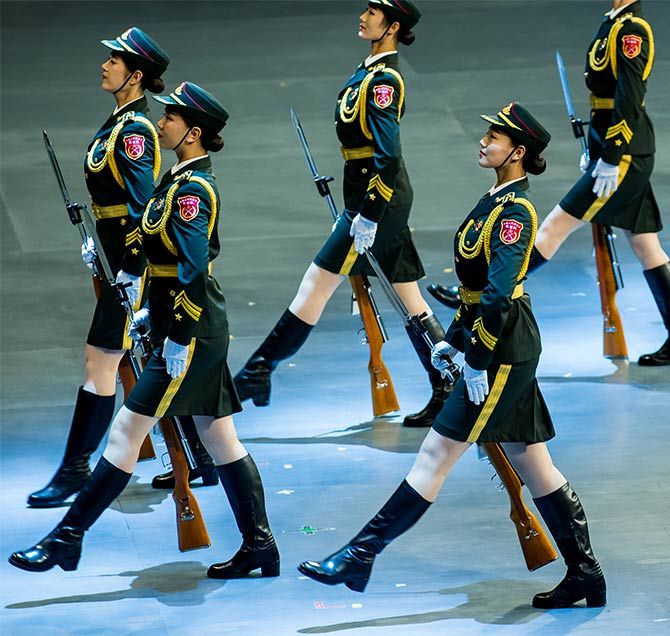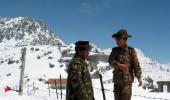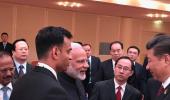Beijing should remember the advice of its celebrated military strategist Sun Tzu: 'Fight not unless the position is critical', says Amulya Ganguli.

For on none of the three sides -- India, Bhutan and China -- is there an immediate crisis.
Photograph: Keith Tsuji/Getty Images
In The Art of War, the celebrated Chinese military strategist, Sun Tzu, of the 6th century BC said: 'Fight not unless the position is critical... He will win who knows when to fight and when not to fight.'
Two-and-a-half millennia later, the present-day rulers of China are making the mistake of not knowing when to fight and when not to. Hence, their verbal warfare and the flexing of muscles by building up the strength of their troops in the icy heights of the Himalayas where they face Indian soldiers.
If the rhetorical flourishes of the Chinese suggest that their spirit is willing but the flesh is weak, the reason is a miscalculation of their initial forays into a region of fuzzy international borders.
As the Chinese entered the Doklam plateau, where the boundaries of India, Bhutan and China meet, ostensibly to build a road (always a handy excuse), they never thought that they would come up against the kind of resistance they are now facing.
Firstly, because they claimed that the area was Chinese territory.
And secondly, because they believed that if anyone objected to their presence, it would be the Bhutanese whom the Chinese could contemptuously ignore.
In fact, when the Bhutanese soldiers did ask a few questions, they were pushed back by the Chinese.
What the Chinese probably did not expect -- though they should have -- was that the Indians would intervene in accordance with their agreements with Bhutan, and the old doctrine of spheres of influence, which no country would like to be infringed.
What the Chinese also might not have expected was that the Indians would stand their ground despite Beijing's threat of repeating the 1962 lesson.
The second Chinese mistake was that they did not factor in the consequences of a prolonged stalemate if the Indians did not withdraw.
Now that the standoff is eight weeks old, the Chinese are apparently considering a military operation while realizing that such acts can spin out of control.
They also know that with winter on its way, they do not have much time to decide.
For if the two sides cannot agree on a simultaneous withdrawal -- as India wants -- they will have to scale down their presence anyway because of the inclement weather.
If a war -- even a short one -- does break out, it will be in contravention of Sun Tzu's warning against lighting a fire when the situation is not critical.
For on none of the three sides -- India, Bhutan and China -- is there an immediate crisis except that, in India's case, there is the fear of China securing a foothold over an area that is not far from the so-called Chicken's Neck link of roads and other forms of communication between India and its north-eastern parts.
Otherwise, there is no threat to the mainland of the three countries.
However, a question of ego is involved.
For China, it is unthinkable to back down when facing, what it considers, a much weaker nation.
Such a retreat will be all the more unacceptable to its President Xi Jinping, who is being dubbed by observers as the new Mao Zedong.
But his aspirations to step into the shoes of the Great Helmsman will be quashed if the Chinese troops have to withdraw from the Doklam plateau, especially because the Chinese consider it to be their own territory.
In that event, it will be a disaster for President Xi on the scale of Mao's Great Leap Forward and the Cultural Revolution. He simply cannot accept such a setback on the eve of the Communist party Congress where his future will be decided.
On the other hand, if a war breaks out, not only will much of the opprobrium be heaped on Xi's head, his pet Belt and Road Initiative, which runs through Pakistan occupied Kashmir and Pakistan's restive Balochistan province, will come under a cloud.
Besides, the world will speak virtually in one voice in condemning China if only because a military misadventure will confirm its reputation as the neighbourhood bully, which was highlighted by its refusal to abide by an international tribunal's directive on the South China Sea.
Already, the officially controlled Chinese media has bemoaned international support for India because of its democracy.
In a face-off between a democracy and a totalitarian State, the former always wins in the court of world public opinion.
To complicate matters, another totalitarian country, North Korea, is threatening to nuke the American-controlled island of Guam in the Pacific Ocean while a mystic has predicted the outbreak of World War III by October.
United States President Donald J Trump, too, has vowed to rain down fire and fury on North Korea if it does not behave.
Evidently, this is not the time for China to indulge in dangerous brinkmanship, especially when there is no guarantee that it will score a clear victory.
It will be better for it to follow Sun Tzu's advice about knowing when not to fight.
Amulya Ganguli is a writer on current affairs.










